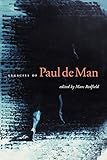Legacies of Paul de Man / ed. by Marc Redfield.
Material type: TextPublisher: New York, NY : Fordham University Press, [2022]Copyright date: ©2007Description: 1 online resource (236 p.)Content type:
TextPublisher: New York, NY : Fordham University Press, [2022]Copyright date: ©2007Description: 1 online resource (236 p.)Content type: - 9780823227617
- 9780823292028
- online - DeGruyter
| Item type | Current library | Call number | URL | Status | Notes | Barcode | |
|---|---|---|---|---|---|---|---|
 eBook
eBook
|
Biblioteca "Angelicum" Pont. Univ. S.Tommaso d'Aquino Nuvola online | online - DeGruyter (Browse shelf(Opens below)) | Online access | Not for loan (Accesso limitato) | Accesso per gli utenti autorizzati / Access for authorized users | (dgr)9780823292028 |
Frontmatter -- Contents -- Acknowledgments -- Introduction: Legacies of Paul de Man -- I . Reading -- Double-Take: Reading de Man and Derrida Writing on Tropes -- Reading, Begging, Paul de Man -- II. Reading History -- History against Historicism, Formal Matters, and the Event of the Text: de Man with Benjamin -- Discontinuous Shifts: History Reading History -- III. Institutions of Pedagogy -- ‘‘At the Far End of This Ongoing Enterprise . . .’’ -- Professing Literature: John Guillory’s Misreading of Paul de Man -- IV. Theory, Materiality, and the Aesthetic -- Thinking Singularity with Immanuel Kant and Paul de Man: Aesthetics, Epistemology, History, and Politics -- Seeing Is Reading -- Appendix 1 Courses Taught by Paul de Man during the Yale Era -- Appendix 2 ‘‘Course Proposal: Literature Z’’ -- Contributors -- Notes -- Index
restricted access online access with authorization star
http://purl.org/coar/access_right/c_16ec
More than twenty years after his death, Paul de Man remains a haunting presence in the American academy. His name is linked not just with "deconstruction," but with a "deconstruction in America" that continues to disturb the scholarly and pedagogical institution it inhabits. The academy seems driven to characterize "de Manian deconstruction," again and again, as dead. Such reiterated acts of exorcism testify that de Man's ghost has in fact never been laid to rest, and for good reason: a dispassionate survey of recent trends in critical theory and practice reveals that de Man's influence is considerable and ongoing. His name still commands an aura of excitement, even danger: it stands for the pressure of a text and a "theory" that resists easy assimilation or containment. The essays in this volume analyze and evaluate aspects of de Man's strange, powerful legacy. The opening contributions focus on his great theme of "reading"; subsequent chapters explore his complex notions of "history," "materiality," and "aesthetic ideology," and examine his institutional role as a teacher and, more generally, as a charismatic figure associated with the fortunes of "theory." Because the notion of legacy immediately raises questions about the institutional transmission of thought, the collection concludes with two appendixes offering documentary aids to scholars interested in de Man as an institutional presence and pedagogue. The first appendix lists the courses taught by de Man at Yale; the second makes available a previously unpublished document, almost certainly authored by de Man: a course proposal for the undergraduate course "Literature Z" that de Man and Geoffrey Hartman began teaching at Yale in the spring of 1977.
Mode of access: Internet via World Wide Web.
In English.
Description based on online resource; title from PDF title page (publisher's Web site, viewed 03. Jan 2023)


